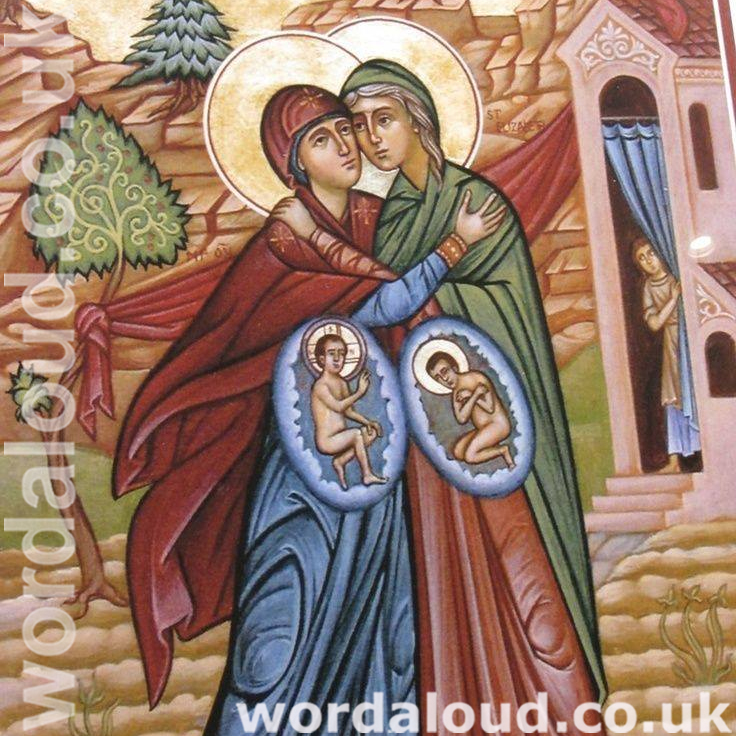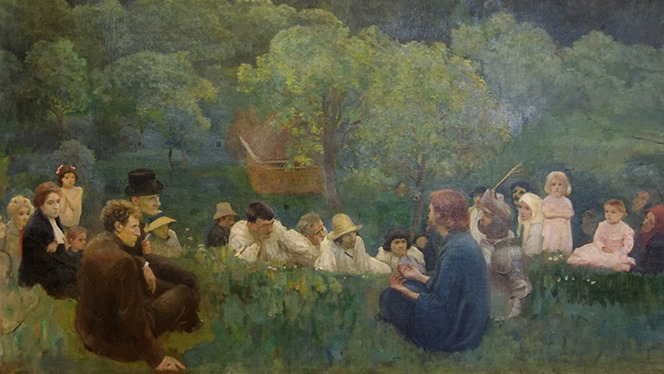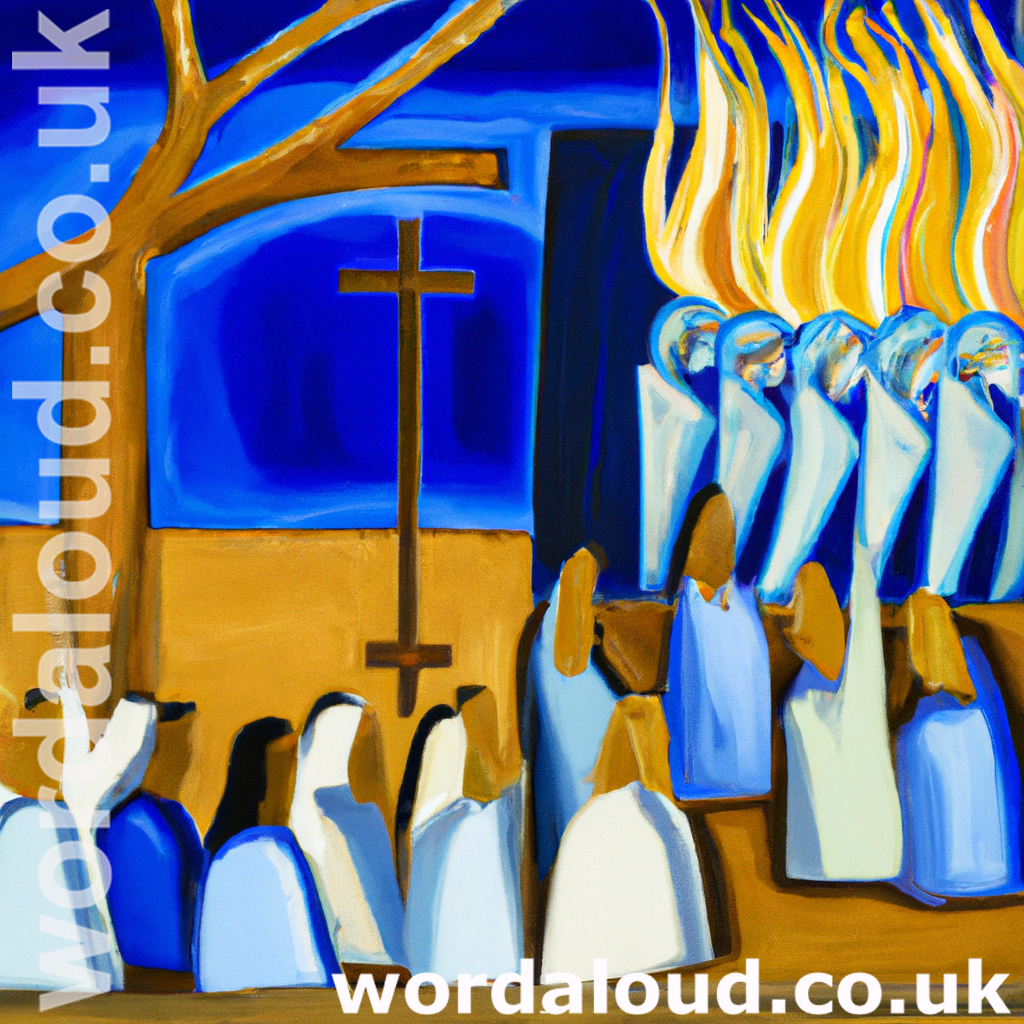Christian Art | King James Audio Bible KJV | Parables Of Jesus | Wise And Foolish Virgins
Matthew 25: 1-13 | King James Audio Bible
1 THEN shall the kingdom of heaven be likened unto ten virgins, which took their lamps, and went forth to meet the bridegroom.
2 And five of them were wise, and five were foolish.
3 They that were foolish took their lamps, and took no oil with them:
4 But the wise took oil in their vessels with their lamps.
5 While the bridegroom tarried, they all slumbered and slept.
6 And at midnight there was a cry made, Behold, the bridegroom cometh; go ye out to meet him.
7 Then all those virgins arose, and trimmed their lamps.
8 And the foolish said unto the wise, Give us of your oil; for our lamps are gone out.
9 But the wise answered, saying, Not so; lest there be not enough for us and you: but go ye rather to them that sell, and buy for yourselves.
10 And while they went to buy, the bridegroom came; and they that were ready went in with him to the marriage: and the door was shut.
11 Afterward came also the other virgins, saying, Lord, Lord, open to us.
12 But he answered and said, Verily I say unto you, I know you not.
13 Watch therefore, for ye know neither the day nor the hour wherein the Son of man cometh.
It may seem strange to the modern Christian that Christ should have so earnestly told his disciples to remain on high alert for his coming. Jesus does not speak of a repeat Nativity, of his coming once again being in the form of a vulnerable infant, humbled by the obscurity of the place of his birth. Nor does it seem that those of the elect who live to witness his coming might be easily deceived by the false claims of others to be the Messiah. Rather Jesus’ return is to be unmistakeable. He will come in ‘clouds of glory’. This will be an apocalypse. No one knows when this will be, but we feel it is imminent.
Our modern understanding of the universe is in many ways very different from the understanding of the people of Christ’s time. Scientists teach us to think of the universe as being around 13.7 billion years old, and while we do not know precisely what its future may hold, still we may think of its old age – when, say, there are no more ‘live’ stars – as being countless billions of years away.
Here, though, we have Jesus telling us to stay alert and to be prepared for his coming. What can this mean? What, indeed, might it have meant to those who first wrote down the words of the Bible, which seems to have happened some years after Jesus delivered this sermon? Just as those first scribes might have thought, so we too might think: it hasn’t happened.
The Sermon in the Temple, as told in Matthew chapters 21-25, is an urgent warning to the people he addresses to mend their ways and be true to God. We have come a long way from the Sermon on the Mount, which marked the start of Christ’s ministry, where we were warmly encouraged and told of all that is good in Christian life. Now the darkness is gathering. Jesus is only days from being crucified. The catastrophic destruction of the temple is foretold. And all around, in the house of God, we see hypocrisy, and soiling and rejection of God’s great goodness. It is as if Jesus knows he hasn’t got much time left to save people from terrible error. And we are warned: there will be judgement.
As Christians, we know we are called to the wedding banquet. We are to be Christ’s bride. This seems such an incredible gift – we are not worthy, and yet God through his infinite mercy has sent his Word, his Son, to redeem us. The parable of the ten virgins is drawn from everyday life; it is a scene Jesus’ listeners would immediately recognise, this custom of maidens escorting the bridegroom; and yet it carries the meaning of our redemption, our hope of eternal life. When Christ, our bridegroom, arrives to us, will we be ready with oil for our lamps? Will our souls be prepared or will we have slipped into sloppy, un-Godly ways? Will we be wise or will we be foolish? ‘For many are called but few are chosen.’
In our modern, Christian lives we do not know when catastrophe may visit us. Many of us, by and large, live lives of great comfort. In a sense, the ‘average westerner’ now may be like that rich young man who could not follow Jesus because that would mean selling all he had to give to the poor. We can be thankful for what security we have. And yet shocks do visit us, out of the blue. These may be world news events, a natural disaster, a terrorist attack. It may be on a very personal scale: a loved one you were chatting with yesterday told today that nagging cough is an incurable cancer; the redundancy notice; a speeding motorist taking the bend in the road in the wrong lane. This is not to say we should be afraid, rather to remind us to live every moment with Christ.
And there is another side to this also, which is about opportunity. There are many, many times through our days when God presents us with the chance to do something beautiful. It may be something for ourselves; it may be something for others. It may be very simple, just a kind word to a person who may be feeling lonely, an opportunity to give and to make things better. One day, our ultimate meeting with Christ will surely come. In the meantime, let us keep our knowledge of Christ alive in our hearts each and every moment. Let us watch.
‘Hope, O my soul, hope. You know neither the day nor the hour. Watch carefully, for everything passes quickly, even though your impatience makes doubtful what is certain, and turns a very short time into a long one. Dream that the more you struggle, the more you prove the love that you bear your God, and the more you will rejoice one day with your Beloved, in a happiness and rapture that can never end.’ St Teresa of Avila
![]()
King James Audio Bible | Endnotes
No matter its relatively simple narrative, the Parable of the Ten Virgins – the Wise and Foolish Virgins – is rich with symbolism and holds a deeper message that speaks to the importance of spiritual vigilance, growth and development, and community preparedness in the Christian faith.
One interpretation of the parable is that it is a warning against spiritual complacency and apathy.
The five foolish virgins who failed to bring extra oil can be seen as symbolizing those who neglect their spiritual lives, who are content with a shallow and superficial relationship with God, and who are unprepared for the coming of the bridegroom Jesus.
This interpretation of the parable emphasizes the need for Christians to maintain a continual sense of urgency and readiness in their spiritual lives, to be vigilant and to remain attentive to God’s call, rather than becoming complacent and indifferent.
Additionally, the parable represents stages of spiritual growth and development. The five wise virgins who bring extra oil can be seen as symbolizing those who have advanced further in their spiritual journey, who have a deeper relationship with God and who are ready to enter the wedding feast.
The five foolish virgins can be seen as those in the early stages of their spiritual journey, and who have yet to mature in faith. This interpretation highlights the importance of spiritual growth and development in the Christian life and need for Christians continually to strive for deeper and more intimate relationship with God.
The wedding feast, in this parable, is the Kingdom of God.
The arrival of the bridegroom is Jesus’ second coming – the Parousia.
The parable informs the Christian community to be prepared and ready to receive Jesus when he returns, and not caught off guard and left outside. We are to be vigilant and watchful.
The Parable of the Ten Virgins holds significance for the wider Christian community because it emphasizes the need for unity and cooperation among believers. The fact that the virgins are all invited to the wedding feast and are considered to be bridesmaids highlights the idea that all are welcomed and included in the Kingdom of God, regardless of their spiritual maturity or level of devotion.
This message of inclusion is a powerful reminder of the love and grace of God and the importance of Christians working together to spread this message of hope and salvation to the world.
In terms of the application of this parable to contemporary Christian life, the parable calls to be continually mindful of our spiritual state and to strive for deeper relationship with God, to be vigilant and ready to respond to God’s call whenever and wherever it may come.








